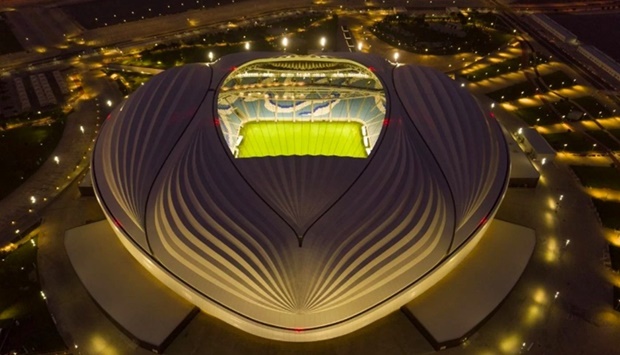Designed by the late British-Iraqi architect Zaha Hadid, Al Janoub Stadium in Al Wakrah was officially inaugurated on 16 May 2019 when it hosted the Amir Cup final.
Here we take a closer look at the venue that is set to host seven matches during the FIFA World Cup Qatar 2022.
Design
Located 23km from central Doha, the stadium’s design is inspired by traditional dhow boats that pay tribute to Al Wakrah’s maritime history, with the futuristic design seamlessly connecting tradition with modernity.
 “When Zaha Hadid studied the city of Al Wakrah and the area surrounding the stadium, she was inspired to integrate seafaring elements into the design, shaping the exterior to look like a pearl, and the interior to look like a dhow boat,” said Abdulaziz al-Ishaq, the stadium’s Facilities Management Director.
“When Zaha Hadid studied the city of Al Wakrah and the area surrounding the stadium, she was inspired to integrate seafaring elements into the design, shaping the exterior to look like a pearl, and the interior to look like a dhow boat,” said Abdulaziz al-Ishaq, the stadium’s Facilities Management Director.
Capacity
The stadium will host 40,000 fans during Qatar 2022.
Transport
Al Janoub Stadium is easily accessible by road or metro. Al Wakrah station, on the Doha Metro Red Line, is just 4.5km away. Shuttle bus services will transport fans to and from the metro on match days.
Location and legacy
After the World Cup, around 20,000 seats from the upper tiers will be donated to support football development projects overseas. The remaining 20,000-capacity venue will be used for football and other sporting events.
During legacy mode, the stadium will become a sporting hub for the Al Wakrah community. Additional facilities are being developed in the stadium precinct, including a cycling and running track. The precinct will also feature a host of other community facilities, including a mosque, multipurpose indoor arena, a school and wedding hall.
The stadium precinct also includes Al Janoub Park – a green space featuring both recreational and children’s play areas.
“Al Janoub Stadium’s location was strategically chosen in order to serve the people of Al Wakrah and those in surrounding areas, as they represent a large demographic of Qatar’s population,” said Al Ishaq.
Sustainability
Al Janoub Stadium has achieved three sustainability certifications: Global Sustainability Assessment System (GSAS) Design & Build Certificate (four stars), GSAS Construction Management Certificate (Class A* rating), and a Seasonal Energy Efficiency ratio certificate for the energy centre.
The stadium’s roof also contributes to its sustainability. The magnificent steel structure provides shade to parts of the pitch which contributes to the efficiency of the stadium’s innovative cooling system.
Contractors
The Al Janoub Stadium project was managed by KEO International Consultants. MIDMAC, Sixco and PORR Qatar were the main project contractors.
Tournament mode
During the FIFA World Cup, Al Janoub Stadium will host seven matches through to the round of 16 stage, including:
22 November: France v Australia (Group D)
24 November: Switzerland v Cameroon (Group G)
26 November: Tunisia v Australia (Group D)
28 November: Cameroon v Serbia (Group G)
30 November: Australia v Denmark (Group D)
2 December: Ghana v Uruguay (Group H)
5 December: Round of 16 (Group E winner v Group F runner-up)

